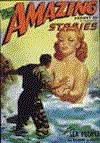|
|
|
Space exploration vital to our survival, says Ben Bova May 19, 2000 By Franklin Harris HUNTSVILLE, ALA. -- Ben Bova can think of lots of reasons to explore space. There are the technological advances that space exploration brings, such as communications satellites, weather satellites and new kinds of materials. Then there is the search for knowledge.
"There are 6 billion people on Earth today, and in 15 years or so there will be 10 billion," Bova said, delivering the keynote speech to NASA's second Turning Goals Into Reality conference at Marshall Space Flight Center. "Each one demands a slice of the pie. Population growth is endangering our species." Bova started writing science fiction in the 1940s. In the time since, he has been editor of Analog and Omni magazines, won the Hugo Award for science fiction six times and written more than 70 works of science fact and fiction. His bestseller, "Mars," was published in 1992 and was followed by a sequel, "Return to Mars." Bova's latest novel, "Venus," was released in April. He also predicted the space race of the 1960s, the discovery of ice on the moon, virtual reality, electronic books and the strategic defense initiative. Bova's love affair with space exploration began when he was 12 and visited a science museum in Philadelphia. It was there that he saw the museum's planetarium, which opened new worlds to him. "I saw there was this huge universe out beyond the narrow streets on which I was living," Bova said. Bova said we can wait for famine, pestilence and death to solve our problems, or we can solve them ourselves. "The solution is to make a larger pie, to increase the human race's store of resources. We can bring resources from space to Earth," Bova said. "Only a handful of people will go into space, but what they do will make life better for the billions on Earth." In the long term, Bova said, once we have established self-sustaining communities off Earth, we will have detached the fate of humanity from the fate of Earth. If a killer asteroid, or a similar disaster, should strike the planet, humanity could survive in space. And billions of years in the future, we will detach ourselves even from the fate of our sun, which eventually will burn out, Bova said. "We have a job to do, the most important and admirable job there is: to ensure the survival of the human race into the far future," Bova said. |

RECENT COLUMNS
Order a helping of Cartoon Network's 'Robot Chicken'
03/31/05
Campaign against video games is political grandstanding
03/24/05
Prize-winning author is 'Wrong About Japan'
03/17/05
Censored book not a good start
03/10/05
Some superhero comics are for 'fanboys' only
03/03/05
'Constantine' does well with its out-of-place hero
02/24/05
'80s publisher First Comics' legacy still felt
02/17/05
Director's cut gives new 'Daredevil' DVD an edge
02/10/05
Put the fun back into 'funnybooks'
02/04/05
Is 'Elektra' the end of the road for Marvel movies?
01/27/05
'House of Flying Daggers' combines martial arts and heart
01/20/05
Anniversary edition of 'Flying Guillotine' has the chops
01/13/05
Movie books still have role in the Internet era
01/06/05
Looking ahead to the good and the bad for 2005
12/30/04
The best and worst of 2004
12/23/04
'Has-been' Shatner is a 'transformed man'
12/16/04
© Copyright 2005 PULP CULTURE PRODUCTIONS
Web site designed by Franklin Harris.
Send feedback to franklin@pulpculture.net.
